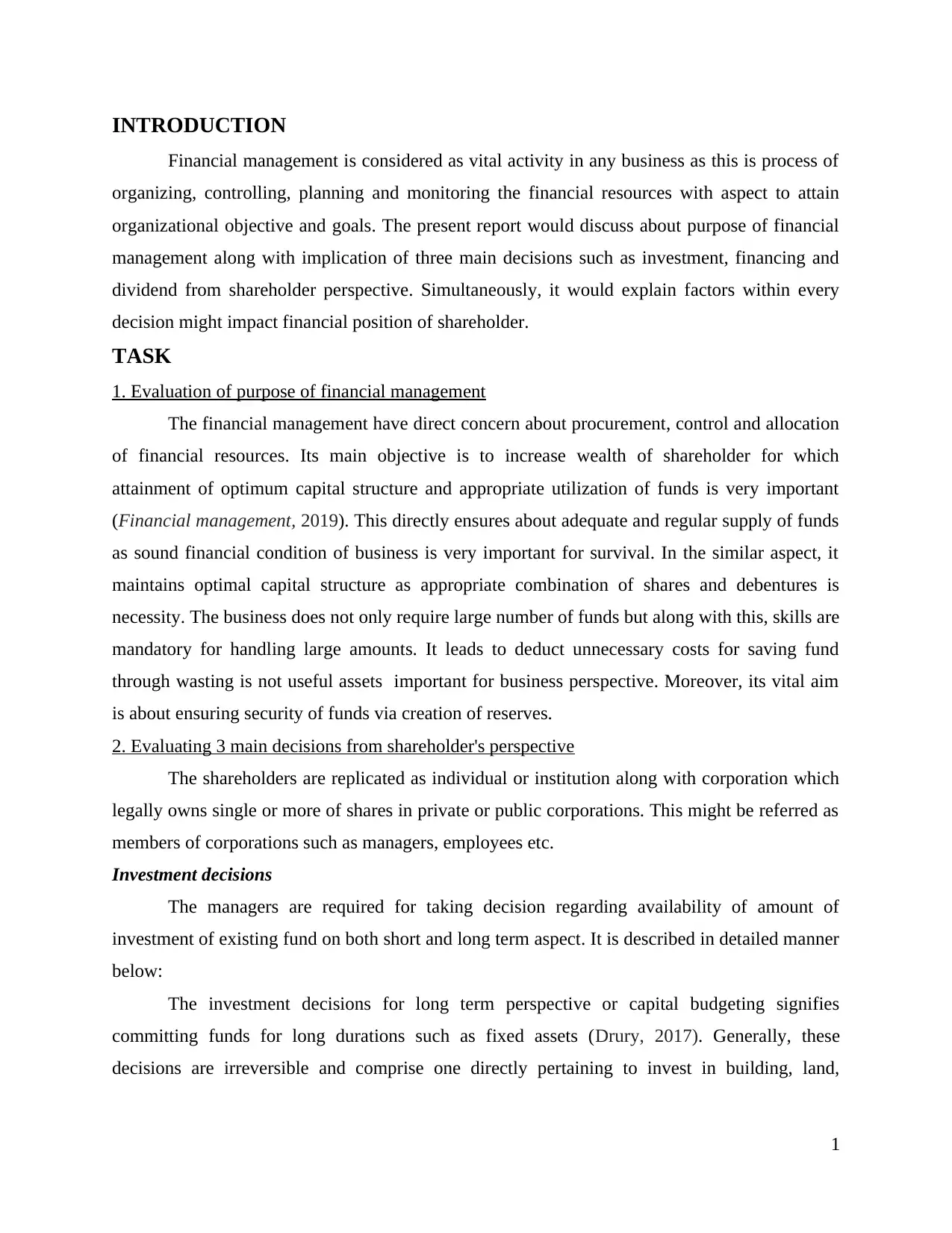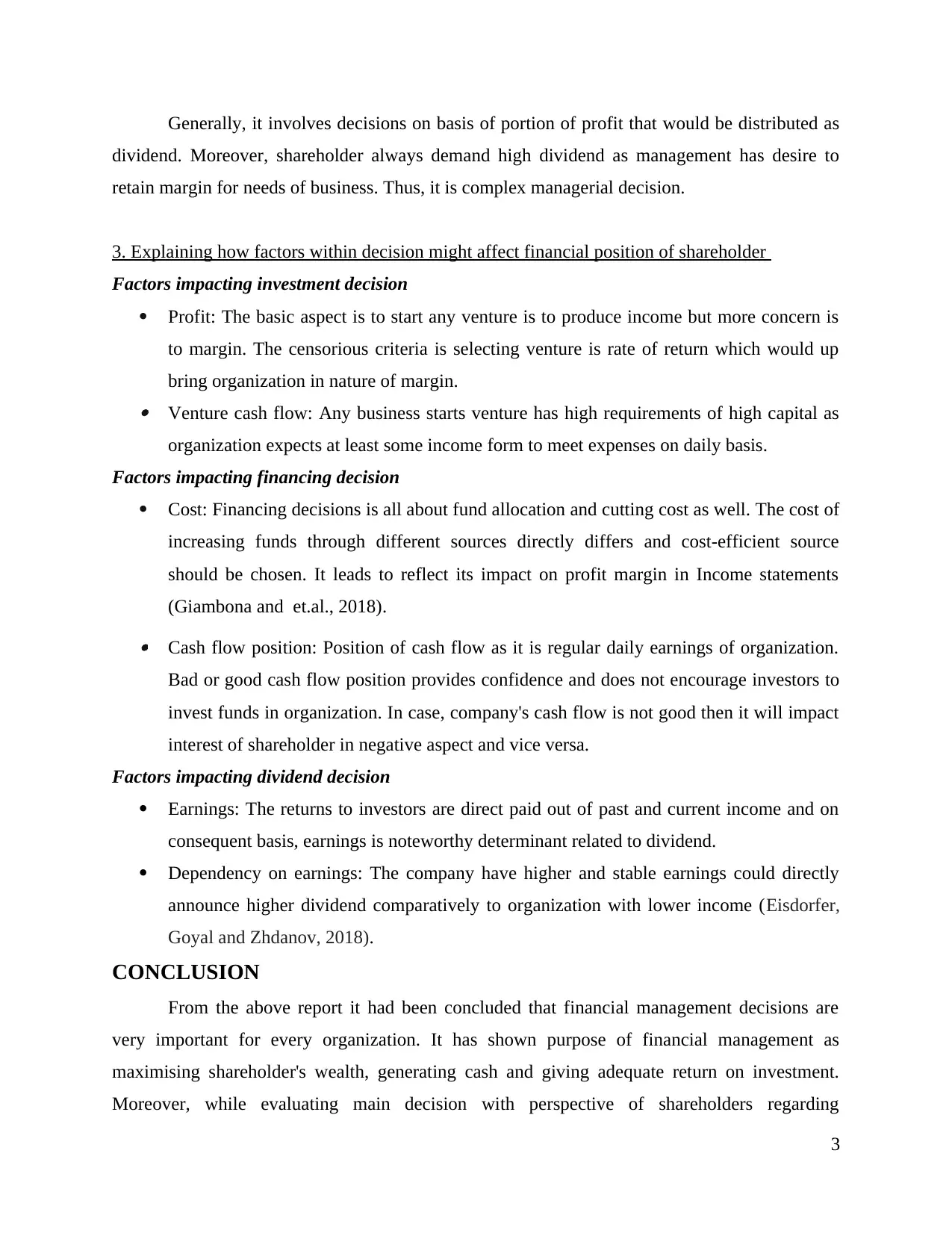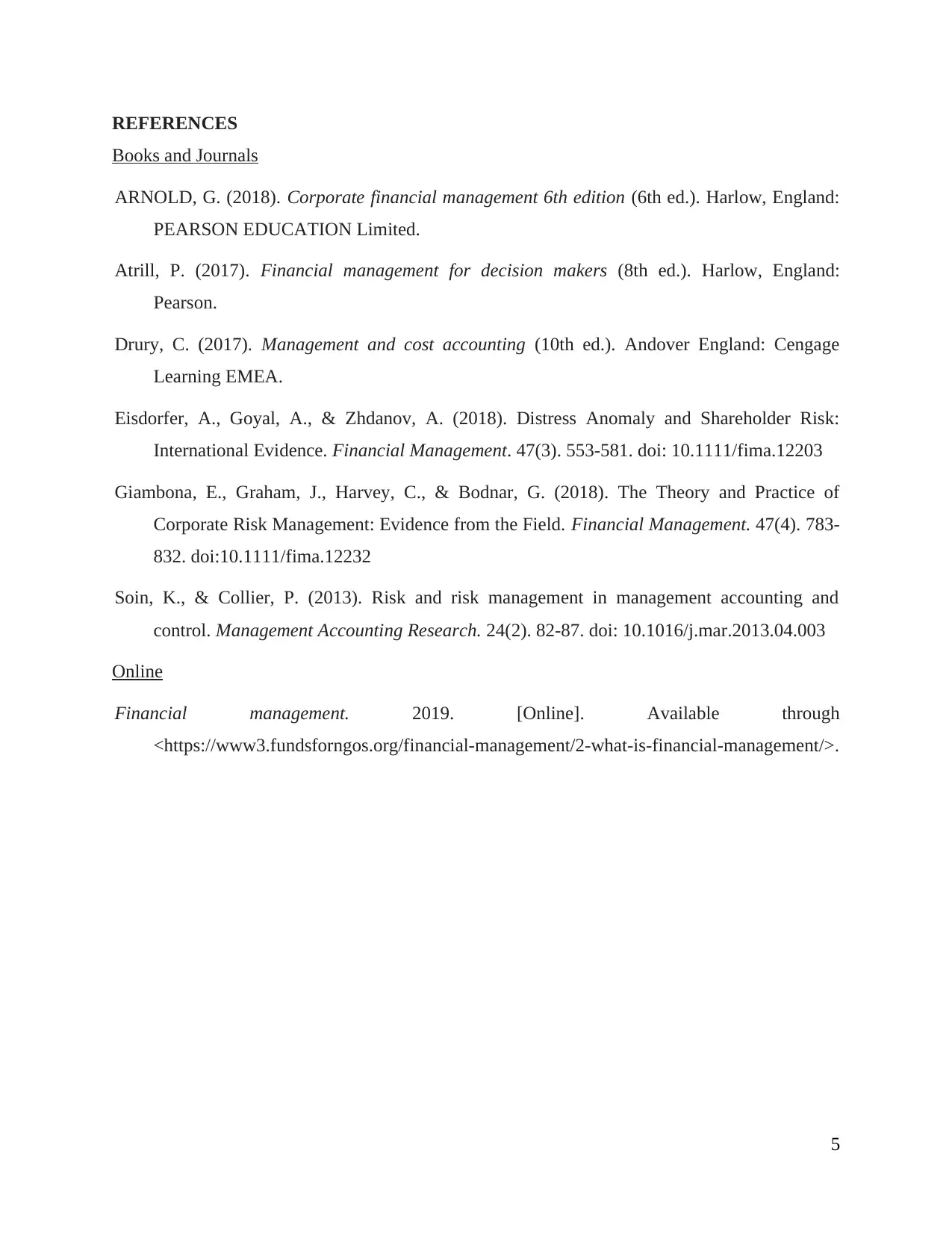Financial Management Report: Shareholder Decisions and Factors
VerifiedAdded on 2021/01/02
|7
|1430
|494
Report
AI Summary
This report delves into the core principles of financial management, emphasizing its role in organizing, controlling, planning, and monitoring financial resources to achieve organizational goals and maximize shareholder wealth. It examines the implications of three crucial financial decisions: investment, financing, and dividend policies, all from the shareholder's perspective. The report provides a detailed analysis of how various factors within each decision area, such as profit, cash flow, cost, and earnings, can significantly influence a shareholder's financial position. Furthermore, it covers the importance of capital structure, working capital management, and the impact of dividend payouts on both short-term and long-term business operations. References from various journals and books support the analysis.

FINANCIAL MANAGEMENT
Paraphrase This Document
Need a fresh take? Get an instant paraphrase of this document with our AI Paraphraser

TABLE OF CONTENTS
INTRODUCTION...........................................................................................................................1
TASK...............................................................................................................................................1
1. Evaluation of purpose of financial management.....................................................................1
2. Evaluating 3 main decisions from shareholder's perspective..................................................1
3. Explaining how factors within decision might affect financial position of shareholder ........3
CONCLUSION................................................................................................................................3
REFERENCES................................................................................................................................5
INTRODUCTION...........................................................................................................................1
TASK...............................................................................................................................................1
1. Evaluation of purpose of financial management.....................................................................1
2. Evaluating 3 main decisions from shareholder's perspective..................................................1
3. Explaining how factors within decision might affect financial position of shareholder ........3
CONCLUSION................................................................................................................................3
REFERENCES................................................................................................................................5

INTRODUCTION
Financial management is considered as vital activity in any business as this is process of
organizing, controlling, planning and monitoring the financial resources with aspect to attain
organizational objective and goals. The present report would discuss about purpose of financial
management along with implication of three main decisions such as investment, financing and
dividend from shareholder perspective. Simultaneously, it would explain factors within every
decision might impact financial position of shareholder.
TASK
1. Evaluation of purpose of financial management
The financial management have direct concern about procurement, control and allocation
of financial resources. Its main objective is to increase wealth of shareholder for which
attainment of optimum capital structure and appropriate utilization of funds is very important
(Financial management, 2019). This directly ensures about adequate and regular supply of funds
as sound financial condition of business is very important for survival. In the similar aspect, it
maintains optimal capital structure as appropriate combination of shares and debentures is
necessity. The business does not only require large number of funds but along with this, skills are
mandatory for handling large amounts. It leads to deduct unnecessary costs for saving fund
through wasting is not useful assets important for business perspective. Moreover, its vital aim
is about ensuring security of funds via creation of reserves.
2. Evaluating 3 main decisions from shareholder's perspective
The shareholders are replicated as individual or institution along with corporation which
legally owns single or more of shares in private or public corporations. This might be referred as
members of corporations such as managers, employees etc.
Investment decisions
The managers are required for taking decision regarding availability of amount of
investment of existing fund on both short and long term aspect. It is described in detailed manner
below:
The investment decisions for long term perspective or capital budgeting signifies
committing funds for long durations such as fixed assets (Drury, 2017). Generally, these
decisions are irreversible and comprise one directly pertaining to invest in building, land,
1
Financial management is considered as vital activity in any business as this is process of
organizing, controlling, planning and monitoring the financial resources with aspect to attain
organizational objective and goals. The present report would discuss about purpose of financial
management along with implication of three main decisions such as investment, financing and
dividend from shareholder perspective. Simultaneously, it would explain factors within every
decision might impact financial position of shareholder.
TASK
1. Evaluation of purpose of financial management
The financial management have direct concern about procurement, control and allocation
of financial resources. Its main objective is to increase wealth of shareholder for which
attainment of optimum capital structure and appropriate utilization of funds is very important
(Financial management, 2019). This directly ensures about adequate and regular supply of funds
as sound financial condition of business is very important for survival. In the similar aspect, it
maintains optimal capital structure as appropriate combination of shares and debentures is
necessity. The business does not only require large number of funds but along with this, skills are
mandatory for handling large amounts. It leads to deduct unnecessary costs for saving fund
through wasting is not useful assets important for business perspective. Moreover, its vital aim
is about ensuring security of funds via creation of reserves.
2. Evaluating 3 main decisions from shareholder's perspective
The shareholders are replicated as individual or institution along with corporation which
legally owns single or more of shares in private or public corporations. This might be referred as
members of corporations such as managers, employees etc.
Investment decisions
The managers are required for taking decision regarding availability of amount of
investment of existing fund on both short and long term aspect. It is described in detailed manner
below:
The investment decisions for long term perspective or capital budgeting signifies
committing funds for long durations such as fixed assets (Drury, 2017). Generally, these
decisions are irreversible and comprise one directly pertaining to invest in building, land,
1
⊘ This is a preview!⊘
Do you want full access?
Subscribe today to unlock all pages.

Trusted by 1+ million students worldwide

acquiring new machinery or plant or even replacing old ones. These decisions help in identifying
financial pursuits and business performance.
Simultaneously, investment decisions for short term basis or management of working
capital means funds commitment for short duration such as current assets. It consists of decisions
directly pertaining to fund investment in cash, inventory and other short term investments. This
gives direct impact on performance and liquidity of business.
Financing decisions
Managers also undertake decisions related to raising finance through short term source
(working capital) or long term sources (capital structure). It is described below in detailed aspect:
The decisions of capital structure involve determining sources of funds and also engages
decision on basis of selecting external sources such as issuing shares, bonds and borrowing
through banks and internal sources such as retained earnings for increasing funds. In the same
series, it helps in taking financial planning decisions on basis of estimating multiple application
and sources of funds as well. In simple words, it signifies that pre estimating financial
requirements of company for ensuring availability of sufficient finance (ARNOLD, 2018). The
initial objective of financial planning is for ensuring and planning funds available as per
requirement. Furthermore, financial manager must define numerous aspects of financing strategy
as one could also design combination of financing strategy for efficient financial management.
Access to financing is closely linked to maintain constant inflow of capital as savings margin
would not allow operations to continue for much longer without support of additional liquidity.
Dividend decisions
The very vital financial decisions that manager must undertake to dividend policy of
company. This is direct concern with earnings of company would be paid out to shareholders.
This is very necessary for identifying that if produced earnings would be directly reinvested in
organization for improving operations or they would be distributed among shareholders. This is
also possible for selecting mixed policy related to distributed a part in shareholders and
remaining invested in the company (Soin and Collier, 2013). On the contrary, if dividends
distributed are very high, the organization might encounter limitations for expanding and
improving operations management. Dividend decisions are very important for consideration of
growth perspective over long term basis, short term reinvestments are very important.
2
financial pursuits and business performance.
Simultaneously, investment decisions for short term basis or management of working
capital means funds commitment for short duration such as current assets. It consists of decisions
directly pertaining to fund investment in cash, inventory and other short term investments. This
gives direct impact on performance and liquidity of business.
Financing decisions
Managers also undertake decisions related to raising finance through short term source
(working capital) or long term sources (capital structure). It is described below in detailed aspect:
The decisions of capital structure involve determining sources of funds and also engages
decision on basis of selecting external sources such as issuing shares, bonds and borrowing
through banks and internal sources such as retained earnings for increasing funds. In the same
series, it helps in taking financial planning decisions on basis of estimating multiple application
and sources of funds as well. In simple words, it signifies that pre estimating financial
requirements of company for ensuring availability of sufficient finance (ARNOLD, 2018). The
initial objective of financial planning is for ensuring and planning funds available as per
requirement. Furthermore, financial manager must define numerous aspects of financing strategy
as one could also design combination of financing strategy for efficient financial management.
Access to financing is closely linked to maintain constant inflow of capital as savings margin
would not allow operations to continue for much longer without support of additional liquidity.
Dividend decisions
The very vital financial decisions that manager must undertake to dividend policy of
company. This is direct concern with earnings of company would be paid out to shareholders.
This is very necessary for identifying that if produced earnings would be directly reinvested in
organization for improving operations or they would be distributed among shareholders. This is
also possible for selecting mixed policy related to distributed a part in shareholders and
remaining invested in the company (Soin and Collier, 2013). On the contrary, if dividends
distributed are very high, the organization might encounter limitations for expanding and
improving operations management. Dividend decisions are very important for consideration of
growth perspective over long term basis, short term reinvestments are very important.
2
Paraphrase This Document
Need a fresh take? Get an instant paraphrase of this document with our AI Paraphraser

Generally, it involves decisions on basis of portion of profit that would be distributed as
dividend. Moreover, shareholder always demand high dividend as management has desire to
retain margin for needs of business. Thus, it is complex managerial decision.
3. Explaining how factors within decision might affect financial position of shareholder
Factors impacting investment decision
Profit: The basic aspect is to start any venture is to produce income but more concern is
to margin. The censorious criteria is selecting venture is rate of return which would up
bring organization in nature of margin. Venture cash flow: Any business starts venture has high requirements of high capital as
organization expects at least some income form to meet expenses on daily basis.
Factors impacting financing decision
Cost: Financing decisions is all about fund allocation and cutting cost as well. The cost of
increasing funds through different sources directly differs and cost-efficient source
should be chosen. It leads to reflect its impact on profit margin in Income statements
(Giambona and et.al., 2018). Cash flow position: Position of cash flow as it is regular daily earnings of organization.
Bad or good cash flow position provides confidence and does not encourage investors to
invest funds in organization. In case, company's cash flow is not good then it will impact
interest of shareholder in negative aspect and vice versa.
Factors impacting dividend decision
Earnings: The returns to investors are direct paid out of past and current income and on
consequent basis, earnings is noteworthy determinant related to dividend.
Dependency on earnings: The company have higher and stable earnings could directly
announce higher dividend comparatively to organization with lower income (Eisdorfer,
Goyal and Zhdanov, 2018).
CONCLUSION
From the above report it had been concluded that financial management decisions are
very important for every organization. It has shown purpose of financial management as
maximising shareholder's wealth, generating cash and giving adequate return on investment.
Moreover, while evaluating main decision with perspective of shareholders regarding
3
dividend. Moreover, shareholder always demand high dividend as management has desire to
retain margin for needs of business. Thus, it is complex managerial decision.
3. Explaining how factors within decision might affect financial position of shareholder
Factors impacting investment decision
Profit: The basic aspect is to start any venture is to produce income but more concern is
to margin. The censorious criteria is selecting venture is rate of return which would up
bring organization in nature of margin. Venture cash flow: Any business starts venture has high requirements of high capital as
organization expects at least some income form to meet expenses on daily basis.
Factors impacting financing decision
Cost: Financing decisions is all about fund allocation and cutting cost as well. The cost of
increasing funds through different sources directly differs and cost-efficient source
should be chosen. It leads to reflect its impact on profit margin in Income statements
(Giambona and et.al., 2018). Cash flow position: Position of cash flow as it is regular daily earnings of organization.
Bad or good cash flow position provides confidence and does not encourage investors to
invest funds in organization. In case, company's cash flow is not good then it will impact
interest of shareholder in negative aspect and vice versa.
Factors impacting dividend decision
Earnings: The returns to investors are direct paid out of past and current income and on
consequent basis, earnings is noteworthy determinant related to dividend.
Dependency on earnings: The company have higher and stable earnings could directly
announce higher dividend comparatively to organization with lower income (Eisdorfer,
Goyal and Zhdanov, 2018).
CONCLUSION
From the above report it had been concluded that financial management decisions are
very important for every organization. It has shown purpose of financial management as
maximising shareholder's wealth, generating cash and giving adequate return on investment.
Moreover, while evaluating main decision with perspective of shareholders regarding
3

investment, finance and dividend decisions there is determination of factors such as cash flow of
venture, profit, cost, cash flow position, earnings and dependability in earnings.
4
venture, profit, cost, cash flow position, earnings and dependability in earnings.
4
⊘ This is a preview!⊘
Do you want full access?
Subscribe today to unlock all pages.

Trusted by 1+ million students worldwide

REFERENCES
Books and Journals
ARNOLD, G. (2018). Corporate financial management 6th edition (6th ed.). Harlow, England:
PEARSON EDUCATION Limited.
Atrill, P. (2017). Financial management for decision makers (8th ed.). Harlow, England:
Pearson.
Drury, C. (2017). Management and cost accounting (10th ed.). Andover England: Cengage
Learning EMEA.
Eisdorfer, A., Goyal, A., & Zhdanov, A. (2018). Distress Anomaly and Shareholder Risk:
International Evidence. Financial Management. 47(3). 553-581. doi: 10.1111/fima.12203
Giambona, E., Graham, J., Harvey, C., & Bodnar, G. (2018). The Theory and Practice of
Corporate Risk Management: Evidence from the Field. Financial Management. 47(4). 783-
832. doi:10.1111/fima.12232
Soin, K., & Collier, P. (2013). Risk and risk management in management accounting and
control. Management Accounting Research. 24(2). 82-87. doi: 10.1016/j.mar.2013.04.003
Online
Financial management. 2019. [Online]. Available through
<https://www3.fundsforngos.org/financial-management/2-what-is-financial-management/>.
5
Books and Journals
ARNOLD, G. (2018). Corporate financial management 6th edition (6th ed.). Harlow, England:
PEARSON EDUCATION Limited.
Atrill, P. (2017). Financial management for decision makers (8th ed.). Harlow, England:
Pearson.
Drury, C. (2017). Management and cost accounting (10th ed.). Andover England: Cengage
Learning EMEA.
Eisdorfer, A., Goyal, A., & Zhdanov, A. (2018). Distress Anomaly and Shareholder Risk:
International Evidence. Financial Management. 47(3). 553-581. doi: 10.1111/fima.12203
Giambona, E., Graham, J., Harvey, C., & Bodnar, G. (2018). The Theory and Practice of
Corporate Risk Management: Evidence from the Field. Financial Management. 47(4). 783-
832. doi:10.1111/fima.12232
Soin, K., & Collier, P. (2013). Risk and risk management in management accounting and
control. Management Accounting Research. 24(2). 82-87. doi: 10.1016/j.mar.2013.04.003
Online
Financial management. 2019. [Online]. Available through
<https://www3.fundsforngos.org/financial-management/2-what-is-financial-management/>.
5
1 out of 7
Related Documents
Your All-in-One AI-Powered Toolkit for Academic Success.
+13062052269
info@desklib.com
Available 24*7 on WhatsApp / Email
![[object Object]](/_next/static/media/star-bottom.7253800d.svg)
Unlock your academic potential
Copyright © 2020–2026 A2Z Services. All Rights Reserved. Developed and managed by ZUCOL.





